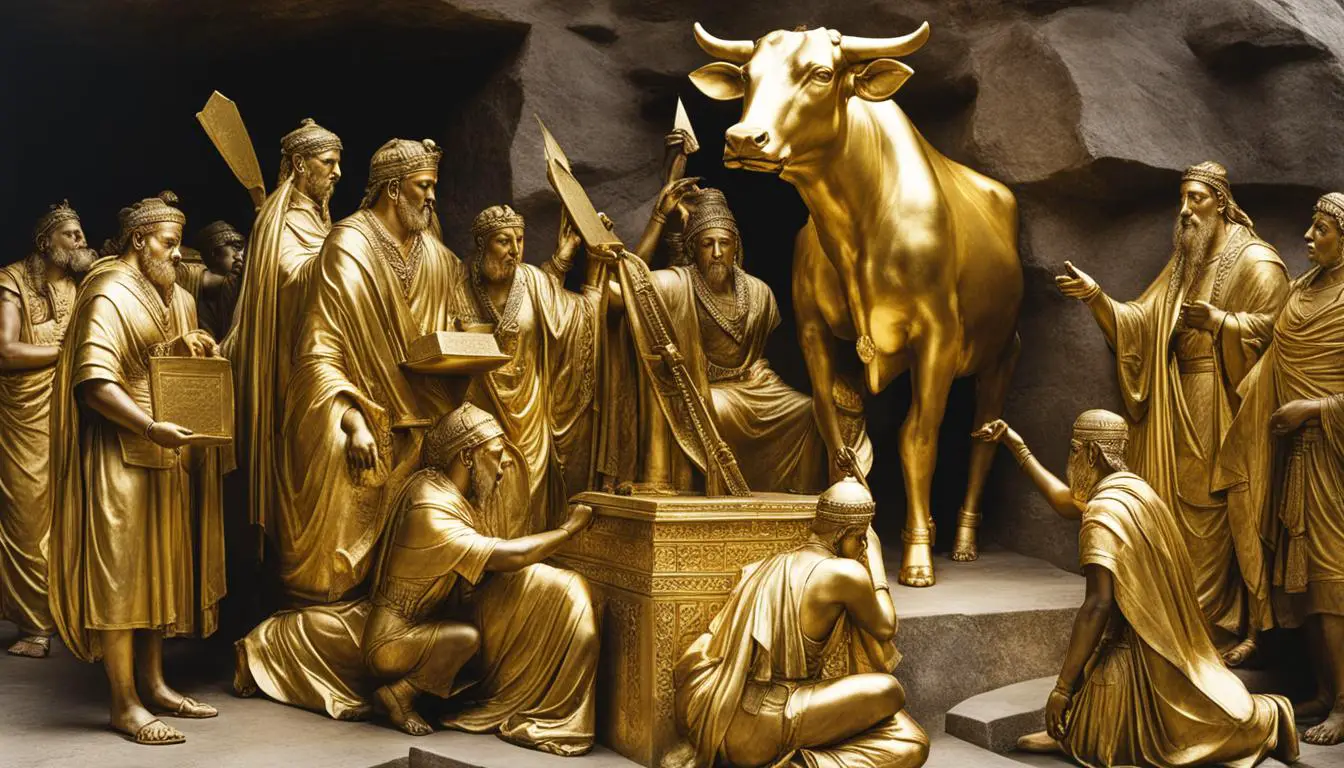The Bible provides a clear definition of idolatry, which refers to the worship of idols or anything made by human hands that is not God. This includes the worship of graven images or carved idols, as well as the worship of other gods or objects. Idolatry is condemned throughout the Bible, with specific commandments against it, such as the Second Commandment in Exodus 20:4-6. The Bible emphasizes that only God should be worshiped, and nothing created by human hands can compare to Him.
In this article, we will delve into the origins and etymology of idolatry, explore the Bible’s view on idolatry, examine the historical context and scholars’ perspectives, uncover idolatry in biblical narratives and stories, discuss the right and wrong ways to worship God, explore idolatry in the modern world, and highlight the different perspectives on idolatry.
Key Takeaways:
- The Bible defines idolatry as the worship of idols or anything made by human hands that is not God.
- Idolatry is condemned throughout the Bible, with specific commandments against it.
- Idolatry can be traced back to ancient times and was prevalent in various cultures.
- The Bible takes a strong stance against idolatry, emphasizing the worship of the one true God.
- Scholars provide valuable insights into the historical context and relevance of idolatry in biblical teachings.
The Origins and Etymology of Idolatry
The term “idolatry” finds its origins in the Greek word “eidololatria,” which means the worship of idols. In the Hebrew language, the word for idol is “pecel,” which refers to a carved image or idol. Throughout history, various ancient cultures engaged in the worship of idols made from wood, metal, or other materials.
In exploring the etymology of idolatry, it becomes evident that the practice has deep roots in human history. In ancient times, idol worship was prevalent, with people attributing divine powers to these carved images. These idols were seen as representations of their gods or sources of supernatural abilities.
One notable example of idol worship in ancient times is the golden calf incident mentioned in the Bible. The Israelites, in a moment of disobedience to God, fashioned a golden calf to worship as their god while Moses was receiving the Ten Commandments from Yahweh. This incident serves as a powerful reminder of the allure and consequences of idolatry, demonstrating how easily humanity can be swayed by tangible objects and false gods.

Table: Examples of Ancient Idols and Their Worship
| Idol | Origin | Associated Deity | Worship Practices |
|---|---|---|---|
| Baal | Canaanite | Baal | Ritual sacrifices, temple worship |
| Ishtar | Mesopotamian | Ishtar | Temple prostitution, religious festivals |
| Aphrodite | Greek | Aphrodite | Offerings, temple visits, prayers |
This table showcases examples of ancient idols and the worship practices associated with them. It provides a glimpse into the diverse ways in which different cultures engaged in idolatry.
The Bible’s View on Idolatry
The Bible takes a strong stance against idolatry, considering it as a form of false worship and an affront to God. Throughout its pages, numerous verses condemn idol worship and highlight the negative consequences of idolatry. For instance, in Exodus 20:4-6, the Second Commandment explicitly forbids the worship of idols or anything that represents God, emphasizing His jealousy and desire for His people to worship Him alone. This biblical perspective on idolatry underscores the importance of worshiping the one true God and rejecting any form of idol worship.
God’s commandments against idolatry serve as a moral compass and guide for believers. The Bible consistently portrays idolatry as a grave offense that leads to spiritual and moral corruption. In 1 Corinthians 10:14, the apostle Paul warns against idolatry and urges believers to flee from it, emphasizing the need for sincere and exclusive devotion to God. The consequences of idolatry can be seen throughout biblical narratives, where people who engaged in idol worship faced judgment and experienced the negative outcomes of their actions.
Idolatry is not only the worship of false gods or idols, but it can also manifest in the form of prioritizing material possessions, wealth, or success above God. This broader perspective on idolatry reveals the need for believers to examine their hearts and ensure that they are not placing anything or anyone above God in their lives.
Table: Bible Verses About Idolatry
| Verse | Meaning |
|---|---|
| Exodus 20:4-6 | God’s commandment against worshiping idols or anything that represents Him. |
| 1 Corinthians 10:14 | Paul’s warning to flee from idolatry and pursue sincere devotion to God. |
| 1 John 5:21 | Apostle John’s admonition to guard against idols and false gods. |
| Galatians 5:20 | List of vices that include idolatry as a sinful behavior. |
The Bible’s condemnation of idol worship serves as a timeless reminder to believers to prioritize their worship and devotion to the one true God. By understanding and adhering to the biblical perspective on idolatry, individuals can cultivate a deeper relationship with God and live in accordance with His teachings. It is essential to constantly examine one’s own heart, ensuring that no idols or false gods occupy a higher place than the Almighty.

Historical Context and Scholars’ Perspectives on Idolatry
Understanding the historical context of idolatry is essential for gaining insights into its significance in biblical narratives. Scholars have extensively studied this topic, analyzing archaeological findings and historical texts to shed light on the cultural practices and beliefs surrounding idol worship. According to their research, idolatry was prevalent in ancient Near Eastern cultures, including the societies in which the Israelites lived.
Interpretations of idol worship in the Bible vary among scholars. While some focus on the physical worship of idols and graven images, others explore the broader concept of idolatry, which encompasses the worship of wealth, power, or other intangible idols. These different perspectives contribute to a more comprehensive understanding of the multifaceted nature of idolatry.
“Idolatry was deeply ingrained in the ancient societies of the time, extending beyond the mere worship of physical idols. It was a complex belief system intertwined with cultural, social, and economic factors.” – Dr. Sarah Thompson, Biblical Scholar
By examining the historical context and scholars’ perspectives on idolatry, we can grasp the magnitude of its influence in biblical times and its relevance to the teachings of the Bible today.
| Perspective | Key Insights |
|---|---|
| Historical Context | Idolatry was a prevalent practice in ancient Near Eastern cultures, with various idols made from different materials. |
| Scholars’ Perspectives | Interpretations of idol worship in the Bible range from the worship of physical idols to broader concepts of idolatry. |
Through continued research and analysis, scholars strive to deepen our understanding of the historical, cultural, and theological aspects of idolatry. Their studies provide valuable insights into the complex nature of idol worship and its significance in biblical narratives.

Scholarly Interpretations of Idol Worship
- Dr. David Cohen suggests that idolatry in the Bible represents a rejection of monotheism and a turning away from the one true God.
- Professor Rachel Green argues that idol worship can be seen as a metaphor for the human tendency to seek meaning and fulfillment in material possessions rather than in spiritual connections.
- Dr. James Thompson proposes that idolatry should be understood as a form of misplaced love, where individuals prioritize something or someone above God.
- Professor Sarah Johnson highlights the societal and cultural pressures that influenced ancient idol worship, emphasizing the need to consider the broader context in which idolatry occurred.
These diverse interpretations contribute to the ongoing discussions surrounding idol worship and provide valuable perspectives for understanding its implications in biblical teachings.
Idolatry in Biblical Narratives and Stories
The Bible is replete with stories and narratives that exemplify the consequences of idol worship and the unwavering faith of those who resisted it. These stories serve as cautionary tales and demonstrate the destructive nature of idolatry. Let us explore some notable examples of idol worship in the Old Testament and delve into the repercussions depicted in biblical narratives.
Idols in the Bible
One of the most well-known instances of idol worship is the story of the golden calf in Exodus. As Moses ascended Mount Sinai to receive the Ten Commandments from God, the Israelites grew impatient and turned to idolatry. They fashioned a golden calf, worshipping it as their god and disregarding their covenant with the Lord. This incident serves as a stark reminder of the allure and dangers of idol worship.
Another impactful narrative is found in the account of Elijah and the prophets of Baal in 1 Kings 18. Elijah challenged the prophets of Baal to a test to prove the power of their respective gods. Despite their fervent pleas and rituals, the prophets of Baal were unable to invoke any response from their idol. In contrast, Elijah’s prayer to the one true God resulted in a dramatic display of divine power, affirming the futility of idol worship.
Consequences of Idolatry in Biblical Narratives
The consequences of idolatry depicted in these narratives and stories are far-reaching. In the case of the golden calf, the Israelites suffered severe consequences for their disobedience. God’s anger was kindled, and many lost their lives as a result. This narrative serves as a sobering reminder of the grave consequences that can accompany idolatry. It underscores the importance of remaining faithful to God and not giving in to the temptation of idol worship.
Similarly, the showdown between Elijah and the prophets of Baal highlights the powerlessness of idols compared to the one true God. It demonstrates that worshiping anything other than the Almighty is futile and ultimately leads to disappointment. This narrative serves as a powerful lesson about the true nature of idol worship and its inherent dangers.
| Biblical Story | Idol | Consequences |
|---|---|---|
| The golden calf in Exodus | A golden calf | God’s anger, loss of lives |
| Elijah and the prophets of Baal in 1 Kings 18 | The prophets of Baal | Powerlessness of idols, affirmation of the one true God |
Through these stories, the Bible vividly illustrates the detrimental effects of idol worship and the importance of remaining faithful to God. They serve as timeless reminders for believers to prioritize the worship of the true God and to guard against the allure of false idols.
The Right and Wrong Ways to Worship God
The Bible provides guidance on the correct worship of God, emphasizing the importance of approaching Him in spirit and truth. Worship is not merely an external act but a genuine expression of reverence and love for God. Here are some key principles and methods of worshiping God according to the Bible.
- Heartfelt Worship: Worshiping God goes beyond rituals and traditions. It involves engaging the heart and offering genuine praise and adoration. As Jesus said, “God is spirit, and those who worship him must worship in spirit and truth” (John 4:24). True worship comes from a sincere and devoted heart.
- Prayer and Thanksgiving: Prayer is a vital aspect of worship, allowing believers to communicate with God and express their gratitude. The Bible encourages us to “pray without ceasing” and give thanks in all circumstances (1 Thessalonians 5:17-18). By seeking God’s presence through prayer and offering thanksgiving, we honor and worship Him.
- Scripture Reading and Meditation: The Bible is a precious gift from God, and worship involves studying and meditating on His Word. Reading Scripture allows us to understand God’s character, His promises, and His will for our lives. Meditating on His Word helps us grow in faith and deepen our relationship with Him.
In addition to these practices, worshiping God also extends to living a life that reflects His character and teachings. As followers of Christ, we are called to demonstrate love, kindness, forgiveness, and compassion towards others. Our actions and choices should honor God and bring glory to His name.
True worship is not confined to a specific time or place. It encompasses all aspects of our lives, permeating our thoughts, words, and actions. As the apostle Paul wrote, “So, whether you eat or drink, or whatever you do, do all to the glory of God” (1 Corinthians 10:31). Every moment can be an opportunity for worship.
As we strive to worship God in the right way, it is essential to continually examine our hearts and motives. Are we seeking to please God or seeking our own desires? Are we following His commands and seeking His guidance? By aligning our lives with His will and worshiping Him with sincerity and truth, we can experience a deeper connection with our Creator and live a life that honors Him.
Idolatry in the Modern World
As societies have evolved, so has the manifestation of idolatry. Although the worship of physical idols may not be as prevalent in today’s world, idolatry takes on different forms that can be equally harmful. Materialistic idolatry has become a significant issue, with many individuals placing an excessive value on wealth, possessions, and success. The pursuit of material gain can consume one’s thoughts and actions, leading to a distorted sense of priorities and a neglect of spiritual growth and genuine relationships.
Covetousness, which is the desire for what others possess, is another form of idolatry that can be observed in modern society. When individuals obsessively long for what others have, whether it is physical possessions, appearances, or achievements, they are essentially placing those things above God. This insatiable desire can lead to discontentment, envy, and a constant pursuit of more, often at the expense of personal values and relationships.
Idolatry also manifests in popular culture, where it influences attitudes, values, and behaviors. Celebrities, influencers, and popular figures can become idols for many, as people look to them for guidance, validation, and inspiration. The media plays a significant role in promoting idolatrous attitudes, perpetuating a culture that values fame, image, and materialism.
The Devastating Impact
This contemporary idolatry has far-reaching consequences on individuals and society as a whole. It fosters a mindset of comparison, competition, and dissatisfaction, leading to a constant quest for more, without finding true fulfillment. The obsession with materialistic idols often leaves individuals feeling empty and disconnected, as they realize that possessions and achievements are fleeting and ultimately do not bring lasting happiness.
“The modern idols of wealth, fame, and success distract us from our spiritual journey and prevent us from living a life of true purpose and meaning.” – Dr. Jane Anderson, Theological Scholar
It is crucial for individuals to recognize the dangers of idolatry in today’s world and develop a healthy perspective on material possessions, success, and popular culture. By placing God at the center of their lives and seeking His guidance, individuals can find true fulfillment, purpose, and contentment. Recognizing and resisting the subtle forms of idolatry in contemporary society allows individuals to live in alignment with their values and deepen their relationship with God.
In Summary
- Idolatry has evolved in modern times, taking the form of materialistic obsession, covetousness, and idolization of popular figures.
- The pursuit of wealth and possessions can lead to a distorted sense of priorities and a neglect of spiritual growth and genuine relationships.
- Covetousness, the desire for what others possess, is a form of idolatry that can lead to discontentment and a constant pursuit of more.
- Popular culture promotes idolatrous attitudes, perpetuating a culture that values fame, image, and materialism.
- This contemporary idolatry has devastating impacts on individuals, fostering comparison, dissatisfaction, and a constant quest for more.
- By recognizing the dangers of idolatry and prioritizing a relationship with God, individuals can find true fulfillment and live a life of purpose and meaning.
| Forms of Idolatry | Implications |
|---|---|
| Materialistic obsession | Distorted priorities and neglect of spiritual growth |
| Covetousness | Discontentment, envy, and constant pursuit of more |
| Idolization of popular figures | Loss of personal identity and values |
Different Perspectives on Idolatry
Idolatry is a topic that engenders varying views and interpretations within religious and theological circles. While there is general agreement on the biblical condemnation of idol worship, there are debates and discussions about the nature and scope of idolatry in different contexts. Some scholars argue for a broader definition of idolatry, extending beyond the worship of physical idols or images to include the idolatry of power, fame, or technology. They emphasize that anything that takes precedence over our devotion to God can become an idol. Others take a more literal interpretation, focusing on the worship of graven images or false gods.
These different perspectives on idolatry reflect the complexities of this topic and its relevance in today’s society. Some argue that idolatry is not limited to religious practices but can manifest in various aspects of modern life. Materialism and the pursuit of wealth, for example, can become idols that drive people’s actions and values. The Bible itself warns against the idolatry of covetousness, highlighting the danger of desiring what others possess. Additionally, popular culture often promotes idolatrous attitudes and values, which can influence individuals’ perspectives and behaviors.
“Idolatry is not limited to external acts of worship; it is an attitude of the heart that can manifest in various ways.”
It is important to note that these differing perspectives do not diminish the seriousness of idolatry according to the Bible. Regardless of the specific interpretation, idolatry is considered a form of false worship that diverts attention and devotion away from the one true God. It is condemned as an affront to God’s sovereignty and a hindrance to spiritual growth. As believers seek to navigate the complexities of idolatry in today’s world, it is crucial to prioritize the worship of the true God and continually examine our hearts and values to ensure that nothing becomes an idol above Him.
Debates on Idolatry in Religious Circles
Within religious circles, debates on idolatry often revolve around the question of what constitutes idol worship in contemporary contexts. Some argue that idolatry is synonymous with anything that replaces or competes with the worship of God, regardless of whether it involves the physical worship of idols. This perspective highlights the importance of worshiping God with a sincere heart and not allowing anything to take precedence over Him. Others emphasize the significance of the physical representation of idols and the historical context of idol worship in biblical narratives. They argue that the worship of false gods or idols made by human hands constitutes idolatry.
These debates on idolatry reflect the ongoing struggle to define and understand this complex phenomenon. The varying views and interpretations provide valuable insights into the multifaceted nature of idolatry and its implications for personal and spiritual life. Considering these differing perspectives can help individuals deepen their understanding of idolatry and its relevance in a contemporary context, guiding them towards a more faithful and authentic worship of the one true God.
Conclusion
In conclusion, understanding the Bible’s definition of idolatry is of utmost importance for personal and spiritual growth. Idolatry, as defined in the Bible, refers to the worship of anything created by human hands that is not God. This includes the worship of graven images, other gods, or material possessions that take precedence over our devotion to God.
By recognizing and avoiding idolatrous practices, we can deepen our relationship with God and align our lives with His teachings. The Bible consistently warns against the dangers of idol worship and emphasizes the need to worship God alone. It reminds us that idolatry leads to spiritual and moral corruption, hindering our spiritual growth and distancing us from the one true God.
In today’s world, idolatry may take different forms, such as the idolization of materialism, success, or fame. Covetousness, the desire for what others possess, is also identified as a form of idolatry. Additionally, popular culture often promotes idolatrous attitudes and values, influencing our perspectives and behaviors.
Therefore, it is crucial to continually examine our hearts and values, ensuring that we prioritize the worship of the true God and resist the allure of idolatrous practices. Understanding the Bible’s perspective on idolatry enables us to navigate the complexities of modern life and live in accordance with God’s principles, leading to a more fulfilling and spiritually grounded existence.
FAQ
What is the definition of idolatry according to the Bible?
Idolatry refers to the worship of idols or anything made by human hands that is not God. This includes graven images, carved idols, and the worship of other gods or objects. The Bible emphasizes that only God should be worshiped, and nothing created by human hands can compare to Him.
Where does the term “idolatry” come from?
The term “idolatry” comes from the Greek word “eidololatria,” which means the worship of idols. In Hebrew, the word for idol is “pecel,” which refers to a carved image or idol.
How prevalent was idol worship in ancient times?
Idol worship was prevalent in ancient times, with various cultures engaging in the worship of idols made from wood, metal, or other materials. The Bible provides examples of idol worship in different biblical narratives, illustrating the prevalence of this practice in ancient societies.
Why does the Bible condemn idolatry?
The Bible takes a strong stance against idolatry, condemning it as a form of false worship and an affront to God. Numerous Bible verses highlight the negative consequences of idolatry and emphasize the importance of worshiping the one true God.
What is the historical context of idolatry?
Scholars have studied idolatry in the context of ancient Near Eastern cultures and the historical background of the Israelites. They have analyzed archaeological evidence and historical texts to understand the cultural practices and beliefs surrounding idol worship.
Are there any stories in the Bible that illustrate the consequences of idol worship?
Yes, the Bible contains numerous narratives and stories that highlight the consequences of idol worship. Examples include the story of the golden calf in Exodus and the narrative of Elijah and the prophets of Baal in 1 Kings 18.
How should worship be done according to the Bible?
The Bible emphasizes that worship should be done in spirit and truth, reflecting a sincere heart and a genuine devotion to God. It also emphasizes the importance of living godly lives and reflecting God’s character through our actions and choices.
Is idolatry still relevant in today’s world?
While idol worship may not be as prevalent in modern society, idolatry takes different forms in today’s world. Materialism, wealth, fame, and success can become idols that drive people’s actions and values. Covetousness, the desire for what others possess, is also identified as a form of idolatry in the Bible.
What are the different perspectives on idolatry?
There are diverse views and interpretations of idolatry within different religious and theological circles. Some argue for a broader definition of idolatry, including the idolatry of power, fame, or technology. Others take a more literal interpretation, focusing on the worship of physical idols or images.








Leave a Reply